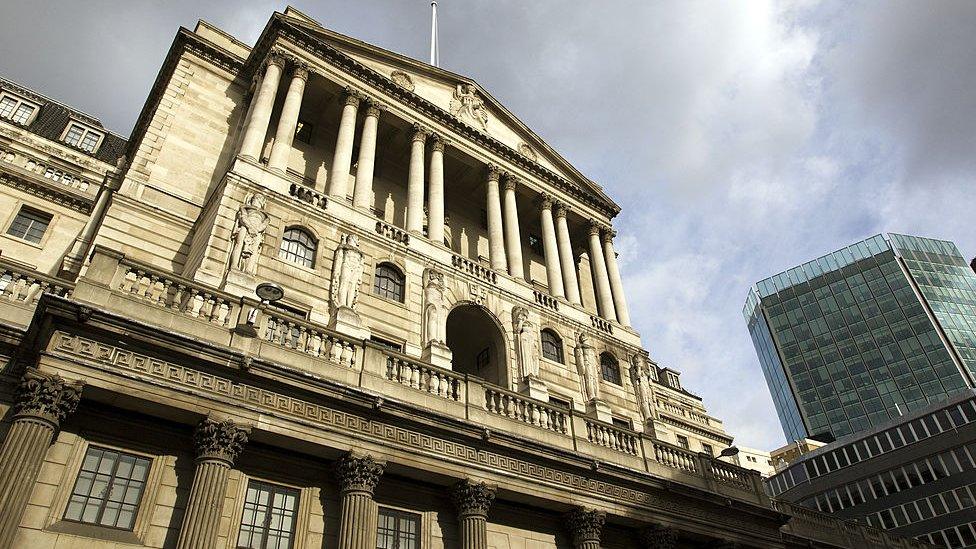Mark Carney urged to cut interest rates to 0%
- Published
- comments

It was initially described as an emergency measure, seven long years ago when UK interest rates were cut to 0.5%, a record low.
That was before the brutal significance of the financial crisis of 2008 had really sunk in.
And the growing realisation that long-term monetary stimulus was necessary to heal the scars of a global banking crisis followed by a global economic crisis.
A year ago, there was the whiff of "normalisation". At that stage, with UK growth leading the developed world, most economists believed the next interest rate rise would be up. Mark Carney suggested as much as he guided market expectations.
Now, all eyes are on the Bank for the midday announcement by the Monetary Policy Committee. And, rather than up, most economists now predict the Bank will cut rates.
Economic uncertainty following the referendum result has increased the risk of recession, many economists argue, and the need for yet looser policy, not tighter.
One, Adam Posen of the Peterson Institute of International Economics, based in Washington DC, and a former member of the MPC, said the cut should be straight down to zero, rather than the 0.25% the market expects.
"They don't really have good choices at this point, so I think what they should do is cut rates to 0% in one fell swoop and thereby give shock and awe - [show] that they are prepared to stimulate the economy," he told me.
"I would say this with the caveat, that I'm sure the people in the MPC are very aware of, that doing this through a major pound move does have real risks of inflation rising and the Bank would have to be prepared to reverse this cut in the coming months or year."
'Go negative'
Sterling has fallen dramatically in value since 23 June, which reduces the price of exports (usually an economic good), but can also create inflation as imports become more expensive.
Mr Posen said the Bank should be willing to "go negative" on interest rates, despite Mr Carney's expressed reluctance to do so.
Negative interest rates can be bad for the UK's retail banks, as they tend to lower the amount of profit they can make on differential interest rates offered to borrowers and savers.
And if their profits dip, the amount of money they feel able to lend could also contract, which would not be good for the economy.
"It's my belief that the MPC is going to have to essentially 'back off' that opposition to negative rates," Mr Posen said.
"Especially given that other central banks are moving to negative rates."
Fiscal adjustments will also be needed, Mr Posen said, welcoming Theresa May's pledge that the government would no longer seek to eliminate the deficit by 2020.
That statement which opens the door to more borrowing rather than further public sector cuts and tax rises.
However, if the ultimate aim is to produce a budget surplus, as Mrs May suggests it is, then the bill will have to be paid at some point.
"I think - along with the vast amount of economic forecasters - you're going to have a real recession, you're going to go into negative growth of at least -1% over the next four quarters and probably past that to the end of 2017," Mr Posen said.
"Unemployment will rise, I hope by not very much. Both the fiscal deficit and the current account deficit will widen by a couple of percent of GDP.
"On the fiscal side, I'm very glad the new prime minister has made it clear that they're not going to respond to this with austerity - that would be a terrible mistake."
'Ahead of the curve'
The possibility of recession is supported by other economists, such as Rupert Harrison, George Osborne's chief of staff who now works for the global investment fund, BlackRock.
He told the BBC that the Bank should cut rates by 0.25% to get "ahead of the curve" before any downturn materialises.
Others say that the Bank, and many economists, should stop being so gloomy about Brexit.
Ashoka Moody, professor of international economics at Princeton University in the US, said that Mr Carney "should send a more encouraging message by holding back on monetary stimulus".
"Brexit's shadow is hard to discern amid the broader global decline in output growth and interest rates that began in early 2014," he told Bloomberg.
Any problems Britain may be facing are not unique, Prof Moody argued.
Many do not agree, describing Brexit as a self-imposed economic challenge.